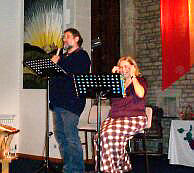


Adrian and Bridget come to St.Philips in support of FYT
|
|
|
|
|
Adrian and Bridget come to St.Philips in support of FYT |
||
by Adrian Plass
I meet many Christians whose desire to follow
Jesus is impeded by a Christian upbringing. Let me explain this foolish
sounding paradox.
Perhaps the most obvious examples of this phenomenon occur in
denominations whose adherents have developed what one could describe as a tribal
approach to life in the church and at home. Dress, behaviour, language, social
interaction and general world-view have been so solidly established over
generations that children simply grow into the shape prescribed for them by the
religious community. Some of the groupings in our own islands are, sadly, clear
examples of this, but all denominations and Christian groupings are vulnerable
to the temptation of making camp at the roadside, as it were, instead of
following Jesus on into unknown and possibly perilous places.
A friend described how, as a teenager in her particular
church, the evils of dancing, cinema and ‘unsuitable’ music were emphasised
constantly to her. So strongly were these terrible things preached against,
that, for her, the Christian faith was defined by the need to avoid such
dangerous pitfalls. Jesus, who replaced ten commandments featuring a lot about
what you shouldn’t do with two commandments about what you must do, hardly
figured in her thinking.
“The problem is,” said my friend, “that the child in me still
believes all the silly things I was taught, even though my mind rejects them and
wants to move on.”
And of course, that’s true of much we learned as children,
isn’t it? I can think of examples in my own life.
I have mentioned elsewhere, for instance, that I still find
it difficult to believe that I can go and buy a new tin of shoe-polish if I want
to. My memory is of there being only one tin in our house through my childhood.
The business of vigorously gouging and scraping one more scrap of polish from
the grooves around the rim of this permanently exhausted container was a daily
battle. New tin? Huh! Never was such a thing. Never will be.
Then there was Wimbledon. I use to watch the BBC coverage of
the Wimbledon tennis fortnight on our black and white television set. Why, I
wondered, was the person at the far end of the court given the advantage of
playing downhill, while his poor opponent at the near end had to hit the ball
extra hard to get the ball to the top of the slope. As I watched my first match
as a spectator at the All England Club, there was a part of me that found it
hard to accept the way in which they had flattened the courts since the days
when it was perfectly clear to me that they had a gradient of about one in
four.
I shared G. K. Chesterton’s boyhood belief that the movement
of the trees created the wind, and not the other way round. Every now and then
the trees at the end of our garden would decide to give the sky a good
thrashing. In the process they would cause anything from a breeze to a howling
gale. I greeted attempts to correct this impression with deep scepticism. The
evidence was before my eyes. It still is.
Speaking of trees, as a small child I knew without any shadow
of doubt that silver-birches were made of solid silver. I dreamed of cutting
through one with a saw and running my fingers over the cold, shining metal
surfaces that would be revealed. There were three silver-birches in our garden.
We were rich. If all else failed we could chop them into slices and sell the
pieces for a fortune. Silver logs. As an adult I still know deep inside myself
that they are made of that precious metal.
My father told me that if I pulled faces I would ‘stay like
it’. The thought haunted me for years. I kept my face as expressionless as
possible. I still do. If I were to laugh or frown – good heavens! – I might stay
like it.
Yes, the things we knew as children may turn out to be
factually incorrect, but that is a mere detail. They are true for
ever.
And that is why Jesus insists we must become like little
children if we wish to enter the Kingdom of God. On the day when we first meet
him, or later on if we are like my friend, who didn’t or couldn’t get round to
it when she should have done, we say these words to him:
“Lord Jesus, as far as I am able, I bring myself before you as an ignorant child. I want to be a blank sheet of paper. I set aside all that I thought I knew, every one of my cherished beliefs and certainties, and I wait for you to fill me with a truth that will last for ever.”
copyright 2001 Adrian Plass
Can I Come In?
by Adrian Plass
What a fortnight we had back at the end of August and beginning of September this year!
It began with the sad death of our dear dog, Rosie, but, being in the midst of hectic preparations for the blessing of my oldest son's marriage, we barely had a moment to mourn her passing. Matthew married his charming Azeri bride, Alina, briefly and technically in Turkey earlier this year. Now they were anxious to do the thing properly, and they wanted "the works". They wanted to be married by a proper vicar in a proper country church, wearing proper wedding clothes with proper guests and a proper wedding reception afterwards. And, of course, ideally it would happen on a proper sunny English day in early September.
Their wishes were granted. The second of September was one of those perfect days when nothing goes wrong and the laughter and tears and other weather all happen in exactly the right places. It couldn't have been more proper.
A thrilling facet of this sparkling jewel of an occasion was the presence of Alina's parents, Irina and Oleg, who flew all the way from Baku, the capital of Azerbaijan, on the evening before the wedding, to be with their daughter on her special day. Azerbaijan is a beaurocratic nightmare. Arranging visas and tickets had been a long, exhausting business for us all. But now, excitingly, if improbably, these two non-English-speaking inhabitants of an oil-producing ex-Soviet republic were comfortably ensconced in a farmhouse bed and breakfast establishment just down the road. Wonderful!
It was in the week after the wedding that my neurosis began to set in. Our house had been occupied and eaten in every day by at least ten people, sometimes twelve. This was fine except that I am famous - or rather infamous for my dislike of clutter and untidiness. Members of my family alternate between derision and annoyance in their response to this aspect of my personality, but there's nothing I can do about it, I'm afraid. I am capable of a sort of cataclysmic untidiness of my own on rare occasions, but the point is that I select those occasions, if you see what I mean.
During that second week I began to understand how servants working in large houses in the Victorian and Edwardian eras must have felt during every day of their lives. Hoovering and washing-up and laying tables and putting things away and preparing meals and taking rubbish to the council tip and shopping and sorting everything out was exhausting. Not, I hasten to add, in case my wife reads this, that I laboured alone. We all worked hard. No, it's just that this completion neurosis of mine drives me past the point of reasonable endeavour, producing a state of wild-eyed frustration in me whenever some innocent soul commits the unforgivable sin of moving a coffee table five degrees from an exact right-angle, or places a coffee-cup on a polished surface without using a coaster. Sad, isn't it?
For the first few days of this feverish activity, though I say it myself, I handled things pretty well. I quite enjoyed an inner, heroic posturing in the role of one working selflessly for the sake of others. I was the host who not only welcomed and entertained, but also laboured ceaselessly behind the scenes with no thought of reward or gratitude. How impressed they must be, I reflected, by the way the house is magically sorted out in their absence each day, calm and ordered in readiness for their return. A good witness too, I thought smugly (may God forgive me!), for Christians to offer those from a distant, pagan land.
At around lunchtime on the thirteenth day I simply ran out of steam and goodwill. Why the dickens was I bothering to clean up after people who just came in and messed it all up again? What was the point? When were they going to acknowledge the hard work I'd been doing? They probably hadn't even noticed. Huh! Fancy coming all this way from a foreign country and letting me slave away like a - like a slave. I felt so tired and irritable and fed-up...
That morning I sat at my desk, head in hands, surveying the wreckage of ny good intentions and the disintegration of my so-called Christian witness. The dwelling place of my faith was in a state of complete disarray, quite unsuitable for visitors. It was at that moment that the gentle voice of Jesus said, very quietly, "May I come in?"
"Please do," I replied, almost tearfully, "only it's a bit of a mess."
"Oh, I've -never minded that," he said, "I'll give you a hand."
"Thank you," I said, and I meant it.
copyright 2000 Adrian Plass
Pearls before Swine
by Adrian Plass
Have you noticed how some bible verses are more or less invisible for years? Then, quite suddenly, it is as though an unseen hand places those words before your eyes in such a way that you must take notice of them. This happened to me very recently when I found myself really wanting to know what Jesus meant when he said that we should not cast our pearls before swine.
What pearls?What swine?
Why shouldn't we feed the latter with the former?
As I thought about these questions a kind of understanding began to form in my mind. Those who have waded through the swamp of my prose in the past will not be surprised to hear that my interpretation is a very subjective one. But you never know, it might send your thinking off into much more profitable directions.
First of all, then, I thought about the fact that pearls are actually formed by oysters as a reaction to and defence against a foreign body or irritant - usually a piece of grit. The result of repeated accretions around the unwanted invader is something that, to human eyes at least, has always been regarded as being very beautiful and extremely valuable. The same thing has happened in my own life. There have been troubles and weaknesses and negative influences threatening to occupy and spoil aspects of my life, many of them having their origins in childhood. I take no pride or satisfaction in these difficult, dark intruders, but I do greatly value the way in which God has formed a pearl of protection around each of them. He has not removed them, because he is good enough to allow me to remain the person that I am. I wear these pearls as symbols of my vulnerability and as illustrations of the way in which God can make something beautiful out of weakness.
In practical terms this means that I am, and always have been, more than happy to mention my problems and weaknesses in any writing or public speaking that I have done. The knowledge that vulnerability is not a sin (Jesus himself is the clearest example of this) can be very helpful to those who have been intimidated by 'perfect' Christians.
I am proud of my pearls.
Who are the swine?
Well, interestingly enough, in this context they are Christians who suffer what seems to be an overwhelming compulsion to put me right. They become very agitated when I appear to be casually open about deficiencies in my Christian life, or the way in which my personality and experience are affected by events or circumstances from my distant past. They undoubtedly think that they are being helpful when they send me books or tapes or leaflets that might address my problems, but they have actually got it wrong. They want to heal my uncertain childhood and my tendency towards flippancy, and my scepticism towards most human organisations, and my habit of hanging about on the edge of things, waiting to see if the truth will end up inside or outside the circles that we nervous Christians seem obliged to form all the time. I don't want them healed, thank you very much, any more than a red-haired person would want the colour of his hair healed, or a left-handed person would want his left-handedness cured or a person who likes singing in the bath would want that habit drawn out of them by the roots, like some sort of verruca.
One of the most wonderful things offered to us by God is his permission to follow Jesus without becoming somebody else. Paul the apostle, for instance, remained, in crucial ways, exactly the man that he had been before his Damascus Road experience, but because of a brand new, God-given perspective, redirected his energies, talents and tendencies towards a completely different goal.
These helpful 'swine' want to remove everything that makes me different from the kind of person that exists only in the context of those strange acts of corporate dishonesty that some Christian congregations specialise in.
Why do they do it?
I suspect that, in the main, this obsession with spiritual blandness springs from a combination of fear and unbelief. I have written elsewhere about insecure leaders being like children left in charge of a house. The task is so worrying that they make up a set of horrendously impossible rules in an attempt to control a situation that appears frighteningly complex. Those who are anxious to get others 'fixed' are often plagued with worry and doubt in exactly the same way. They would have found Jesus terribly worrying two thousand years ago. The even worse news for them is that he hasn't changed at all.
All right, I've probably generalised far too much, but the issue is an important one, and its central truth is worth repeating.
Pearls are valuable things, each one formed around an unwanted, irritant. In their beauty, they transfigure something that could have turned very ugly. Don't let anyone take them away from you.
copyright 2001 Adrian Plass